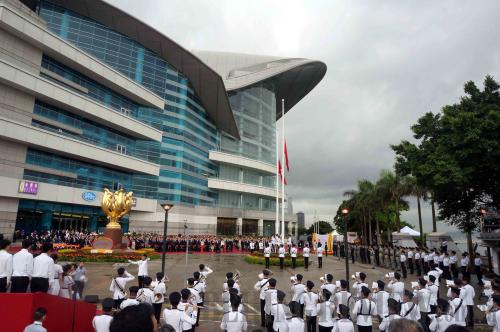|
 |
|
ALLEGIANCE: A flag-raising ceremony is held at the Golden Bauhinia Square outside the Hong Kong Convention and Exhibition Center on July 1 to celebrate the 17th anniversary of Hong Kong's return to China (XINHUA) |
People's Daily, the official newspaper of the ruling Communist Party of China, has recently published a series of editorials marking the 17th anniversary of Hong Kong's return to China following more than a century of British rule. While reaffirming the pertinence of the "one country, two systems" policy, the editorials clarified the respective powers of the Central Government and the Government of the Hong Kong Special Administrative Region (HKSAR), and why patriotism is a prerequisite to good governance in Hong Kong. Following are some edited excerpts:
A cooperative relationship
In the past 17 years since Hong Kong's return to China, the territory has managed to remain prosperous and stable. This should be attributed to the joint safeguarding of the "one country, two systems" policy by the Central Government and the HKSAR. According to the Basic Law, Hong Kong's mini-Constitution, the HKSAR is an inalienable part of the People's Republic of China and is a special administrative region with a high degree of autonomy.
These regulations reveal that in such a unitary state as China, the Central Government possesses comprehensive jurisdiction over all local administrative regions including Hong Kong. This is a detailed expression of the principle of sovereignty, reflecting the Constitution-based responsibilities and obligations of a sovereign state. Based on the policy of "one country, two systems," the Central Government's full jurisdiction over Hong Kong covers its direct exertion of authority as well as its authorization of the HKSAR's high degree of autonomy, over which the Central Government exercises its supervisory power.
In accordance with China's Constitution and the Basic Law of the HKSAR, the central leadership's direct jurisdiction over Hong Kong is not restricted to the power of dealing with foreign and defense affairs that are usually the reflection of sovereignty, but also includes the power of the establishment of the HKSAR; the power of formulation, amendment and interpretation of the Basic Law; the power of appointing the chief executive and major officials; the power of revising selection methods for the chief executive and the Legislative Council of the HKSAR, and supervising the laws adopted by the legislature; the power of decision on the HKSAR entering a state of emergency; and the power of making new authorizations for the HKSAR.
Meanwhile, as is prescribed by the Basic Law, the National People's Congress, China's top legislature, authorizes the HKSAR to exercise a high degree of autonomy as well as executive, legislative and independent judicial powers, including that of final adjudication. A lot of these powers are not enjoyed by regional administrative areas in the mainland. Some of its freedoms are greater than those enjoyed by states in federal republics, and some are only endemic to a sovereign country. The history and realities of Hong Kong have been taken into full consideration, and the Central Government fully trusts and respects Hong Kong. However, no matter how expansive Hong Kong's autonomy is, its legal status as a special administrative region in a unitary state remains unchanged. A high degree of freedom is not equal to absolute autonomy, and is by no means a fixed advantage for Hong Kong. It is merely an administrative power over regional affairs granted by the Central Government.
Under the policy of "one country, two systems," the central authorities' overall jurisdiction does not contradict the HKSAR's high degree of autonomy, and neither of the two can be omitted. The Central Government executes its power at the national level and does not interfere with affairs within the framework of this autonomy. The HKSAR, meanwhile, executes the administrative power of regional affairs. The two kinds of power cooperate with one another and work in accordance with the law, for the purpose of supporting the operation of the system of the HKSAR.
Some believe the less the Central Government interferes with Hong Kong, the better, and that it would be best if the Central Government completely gave up administration over Hong Kong. Others think the Central Government's sovereign powers over Hong Kong should be restricted only to foreign and defense affairs. Some even think that the overall jurisdiction is equal to a "takeover" of Hong Kong. These are misunderstandings of the relationship between the Central Government and the HKSAR, and thus go against regulations in the Constitution and the Basic Law.
Governance and loyalty
"Hong Kong people governing Hong Kong" is an integral maxim of the Central Government's basic policy for administering Hong Kong. From the proposal to the implementation of the "one country, two systems" policy, there have always been clear boundaries and criteria for this idea. That is, Hong Kong is to be administered by patriots.
|
